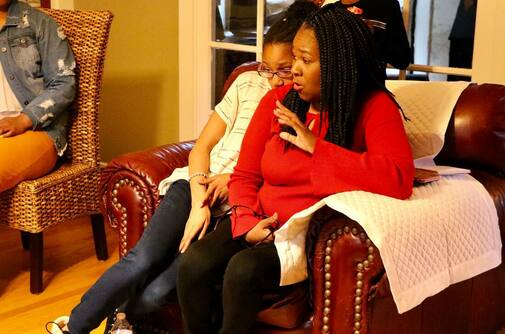|
If the color of my skin poses a problem within public schools; what about the children?
I chose to work in the Washington State public-school system to help educate children and to be a positive role model. As an African-American woman, I want kids of all ethnicities to see that a woman of color can be a mentor like any other school faculty member. I also recognize there are minority children that should have someone they can relate to. I remember how it felt as a child to go to an all-white school and see nobody who looked like me. There was no one to teach me with the compassion and respect for who I was as a black child. The negative experience of feeling alone in school as a kid caused me great emotional pain at the time. What I didn’t plan on was the disrespect I would later receive as the only African-American paraeducator working at my elementary school. From the beginning of my employment, I had to wait for public restrooms to become available while staff restrooms were not in use. There were two bathrooms side by side. One was for staff only and stayed locked. The other unlocked restroom is for the public and was regularly full. After one month of working at the school, I voiced my concern to the HR department. Although all staff in the school worked for the same employer, I received unequal treatment. In the end, I was never given a solid reason for being denied restroom access. Soon after I complained, the mistreatment and feelings of isolation began. Multiple school Administrators would walk past me without acknowledging I was there. Coworkers would make me feel as if I was not in the same room. One day while waiting outside of the public restroom for it to become available, the Vice Principal walks over and looks directly at me. He knew that I didn’t have a key and why I was outside patiently waiting. He let himself into the locked staff restroom without offering to let me go in first. I cried that day, and it still hurts to talk about it. I thought to myself, “this isn’t the Hidden Figures movie, this is 2018! - I should have the same access to the same bathrooms as everyone else!” When I complained again, the retaliation began. I was micromanaged during my duties. I was harassed and made to feel like I wasn’t wanted there. Ultimately, a critical work review was written by the principal at this school and placed in my personnel file. I chose to fight back. Although it was a long battle, I was eventually able to have the negative performance review erased from my permanent file as it was found to have no merit. A district investigator who reviewed my concerns concluded that I was supposed to be given a restroom key as soon as I initially brought the matter to HR. The investigators report concluded that I was forced to work in a hostile work environment. So, if the color of my skin poses a problem within public schools; what about the children? The Public Schools has an increasing number of people of color coming to work within the system. Currently, the work environment at the schools is predominately white, and not accustomed to working with other ethnicities. Most white teachers and administrators have traditionally only worked with black and brown children but not adults of color. In schools, most of the Principals, teachers, and other faculty are white. Most whites have been socially desensitized, and do not see their unfair treatment of people of color as a problem. Many white people go through life with the dissonance that the oppression of black and brown people is acceptable. This belief system (either knowingly or unknowingly), says, “it doesn’t matter what the truth is, I choose not to believe that my negative behaviors towards people of color will impact them in a damaging and hurtful way.” The attitudes of the faculty, their teaching styles, and behaviors affect children and adults of color devastatingly. The full long-term impact is enormous and likely never crosses the minds of the staff. So, what does this say about our school system when our children are taught by people that believe black and brown individuals are second class citizens, and it’s ok to traumatize them? Please ponder that question. The long-term social conditioning of most white people is problematic. This conditioning says; I am superior, I am privileged, and I can get away with anything. These attitudes create emotional trauma for our children and adults. This mentality says that it is acceptable to treat a person like me as less than because I can handle it! I do not wish to be viewed as a person strong enough to withstand these disturbing experiences. The irony is that I have been conditioned to think I am supposed to accept these unhealthy behaviors. This conditioning has led me to suppress the negative impact of what racism has done to my mind and my body. The emotional pain I underwent at work caused me to seek therapy for a job that I only worked part-time at. If I’m affected working only part-time at the school district, what about the children who must endure this type of systemic oppression all day every day? The kids are told to deal with it by their parents and by society because they must go to school, right? Children do not have a voice, so adults need to be the voice for them. However, if the voice for the children is restricted to those of the privileged and oppressors, then when do the children ever get a chance to be represented? There will be more minorities coming to work in the educational system. They will be working with white teachers and administrators who are untrained on the biases they knowingly and unknowingly hold against people of color. If this does not change, there will be more complaints, more litigations, and more lawsuits. However, if you are proactive, and identify the biases within the schools, then provide training immediately, you can avoid future problems while providing a better environment for the staff and children. I want to see positive change in the future and gladly offer my help in achieving this. Sharon Blake www.facebook.com/sharonblake888 Editor John A. Huguley
0 Comments
Leave a Reply. |
Archives
July 2023
Radio Interviews
Media Links
|




 RSS Feed
RSS Feed
